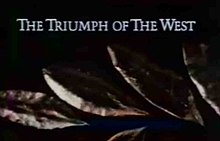The Triumph of the West
The Triumph of the West was a thirteen part BBC television series written and presented by John Roberts, historian and Warden of Merton College, Oxford, and first broadcast in 1985. The series was subtitled A View of History by John Roberts.[1]

Premise
The 13 one-hour episodes examined the socio-economic, political, and cultural movements that shaped world history. [2] The series painted a broad canvas but avoided simplistic solutions, encouraging the audience to think and reach its own conclusions. [3] In one episode, Roberts asks the question why, during the age of European expansion, as European traders circled the globe, no Arab dhows or Chinese junks ever docked in the British port of Southampton. As the NY Times reviewer put it: "at least it is a provocative question". [1]
Episodes
- Episode 1 - Dangerous Gifts: the benefits and costs of Western influence
- Episode 2 - A New Direction: Influences from ancient Graeco-Roman and Judeo-Christian culture
- Episode 3 - The Heart of the West: The emergence of Europe from the Dark Ages
- Episode 4 - Islam: The World's Debate - Islam Vs. Judeo-Christianity
- Episode 5 - East of Europe: Byzantium
- Episode 6 - The Age of Exploration: Europe explores New Worlds
- Episode 7 - New Worlds
- Episode 8 - Age of Light: The Renaissance
- Episode 9 - Monuments to Progress: The Industrial Revolution
- Episode 10 - India: The Ironies of Empire - India before, during and after colonial domination
- Episode 11 - The East is Red: China in the Twentieth Century
- Episode 12 - The Decline of the West (Two World Wars and The Great Depression)
- Episode 13 - Capitulations: Third World countries learn the price of dependency on the West[4]
References
- New York Times Review By John Corry, September 17th 1986 Retrieved 12 July 2020
- The Triumph of the West at the IMDB
- Guardian Obituary of John Roberts Retrieved 13 July 2020
- The Triumph of the West Official DVD Retrieved 13 July 2020
External links
- British Universities Film and Video Council Retrieved 12 July 2020
- The Triumph of the West at the BBC Retrieved 12 July 2020
- New York Times Review By John Corry, September 17th 1986 Retrieved 12 July 2020